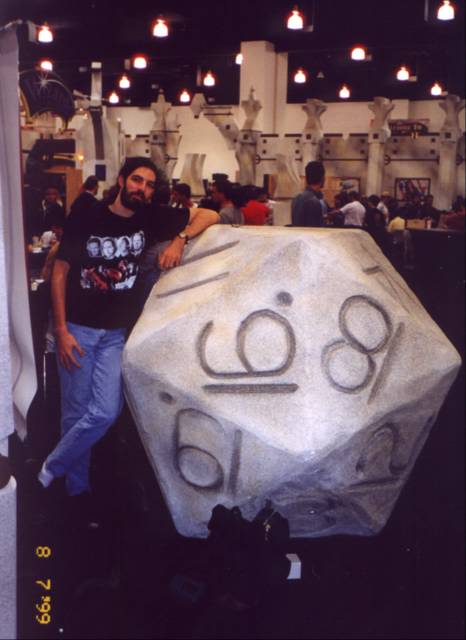ROBA for March 2010
Another month, another ROBA gaming session. This time it was my buddy Carl and I, his first time attending. Carl is one of my favorite players to have at the table. He's fun, capable, and willing to play just about anything. This month attendance seemed a little light, and the place seemed to empty somewhat early. There weren't many people there when we left around 6:00. Here's what we played.
We started off with a game of Shadow Hunters. I got a copy of this via Z-Force a couple of months ago and have been trying to get it to the table. One of my fellow gamers at ROBA brought their copy also, and said it was a favorite of hers, and so was happy to teach it. We played a 6-player game. For those who don't know, Shadow Hunters is a game where each player is dealt a character card at the beginning and no one else knows what it is. Each character is either a Hunter (trying to kill all the Shadows) a Shadow (trying to kill all the Hunters) or a Villager (with unique victory conditions.) You need to figure out who is who, then begin attacking your enemies and assisting your teammates. Most of the detective work is done via Hermit Cards. They say things like "I'll bet you're a Hunter! If you are, then take 2 damage." Between the cards and watching the interactions of the other players you need to deduce who is who.
I was a Werewolf, and revealed myself fairly early mostly just to see how the game works. I was the second person to be eliminated after the game explainer, who was a Hunter. One of the Villagers won on a questionable rules call, but Shadow Hunters was fun and everyone had a good time. I'm gonna try and get this to the table at my FLGS this week.
We then moved on to Brass, a game I've owned since August of last year but have been unable to get to the table. It was a 4-player game with 3 new players and someone who had played before a year or 2 ago. It played more smoothly than I expected from reading the rules. This comes from the many exceptions to the rules which don't come up a lot, so most of the time things are pretty straight forward. It took about 2.5 hours to finish, and it didn't feel like 2.5 hours which is usually the hallmark of a good game. I probably won't get to play Brass very often, but I'd sure like to...
We finished up with a game that's been on my radar for a long time: Saint Petersburg. I'll need to play this one again. I can see the appeal in it and the cleverness, it just didn't really do much to impress me. It's competent but not memorable. I wouldn't mind trying it again to see if I'm missing something.
All told, it was a good time as always.
We started off with a game of Shadow Hunters. I got a copy of this via Z-Force a couple of months ago and have been trying to get it to the table. One of my fellow gamers at ROBA brought their copy also, and said it was a favorite of hers, and so was happy to teach it. We played a 6-player game. For those who don't know, Shadow Hunters is a game where each player is dealt a character card at the beginning and no one else knows what it is. Each character is either a Hunter (trying to kill all the Shadows) a Shadow (trying to kill all the Hunters) or a Villager (with unique victory conditions.) You need to figure out who is who, then begin attacking your enemies and assisting your teammates. Most of the detective work is done via Hermit Cards. They say things like "I'll bet you're a Hunter! If you are, then take 2 damage." Between the cards and watching the interactions of the other players you need to deduce who is who.
I was a Werewolf, and revealed myself fairly early mostly just to see how the game works. I was the second person to be eliminated after the game explainer, who was a Hunter. One of the Villagers won on a questionable rules call, but Shadow Hunters was fun and everyone had a good time. I'm gonna try and get this to the table at my FLGS this week.
We then moved on to Brass, a game I've owned since August of last year but have been unable to get to the table. It was a 4-player game with 3 new players and someone who had played before a year or 2 ago. It played more smoothly than I expected from reading the rules. This comes from the many exceptions to the rules which don't come up a lot, so most of the time things are pretty straight forward. It took about 2.5 hours to finish, and it didn't feel like 2.5 hours which is usually the hallmark of a good game. I probably won't get to play Brass very often, but I'd sure like to...
We finished up with a game that's been on my radar for a long time: Saint Petersburg. I'll need to play this one again. I can see the appeal in it and the cleverness, it just didn't really do much to impress me. It's competent but not memorable. I wouldn't mind trying it again to see if I'm missing something.
All told, it was a good time as always.






























